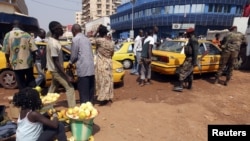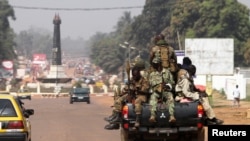BANGUI, CENTRAL AFRICAN REPUBLIC —
Rebels in the Central African Republic continue to threaten the capital, Bangui, as regional leaders work on opening peace talks in January, while deploying troop reinforcements to the frontline.
Rebels in the Central African Republic say President Francois Bozize must go. Their Paris-based spokesman told French television on Monday that they will push south to take Damara, about 75 kilometers from Bangui, if they are attacked.
Damara is the frontline defense for the capital.
About six dozen soldiers from Congo-Brazzaville arrived on Monday in Bangui to reinforce the Central African regional peacekeeping force, FOMAC, which is backing up government troops. Gabon, Chad and Cameroon are also sending in reinforcements.
Congo's ambassador in Bangui, Gabriel Enteha Ebia says the rebels understand that they must stop their advance on Damara. If FOMAC troops are attacked, the ambassador says they will defend themselves and prevent the rebels from taking the area.
The rebel group Seleka began its lightning offensive in the north on December 10. On Saturday, the rebels took the city of Sibut, 186 kilometers from the capital.
Government troops have been outmatched. They were unable to retake the city of Bambari on Friday.
Analysts say government forces did not have a strong presence in the now occupied areas. They say it is unclear how the rebels might fare against regional troops massing in Damara.
Residents of Bangui are anxiously celebrating the new year. The capital is under strict curfew from 7 p.m. to 5 a.m.
On Sunday, President Bozize said he is willing to negotiate with the rebels without conditions, and that he would form a national unity government and not run for a third term in 2016.
A rebel spokesman said that they are open to talks, but under certain conditions, including the release of prisoners.
Seleka unites fighters from as many as four rebel groups in the north. The rebels say the government failed to follow through on peace accords signed between 2007 and 2011 that included paying rebel fighters to disarm and integrating them into the army or back into civilian life.
The Central African Republic has been plagued by insecurity for decades. President Bozize, a former army chief of staff, came to power during in 2003 coup d'etat.
Rebels in the Central African Republic say President Francois Bozize must go. Their Paris-based spokesman told French television on Monday that they will push south to take Damara, about 75 kilometers from Bangui, if they are attacked.
Damara is the frontline defense for the capital.
About six dozen soldiers from Congo-Brazzaville arrived on Monday in Bangui to reinforce the Central African regional peacekeeping force, FOMAC, which is backing up government troops. Gabon, Chad and Cameroon are also sending in reinforcements.
Congo's ambassador in Bangui, Gabriel Enteha Ebia says the rebels understand that they must stop their advance on Damara. If FOMAC troops are attacked, the ambassador says they will defend themselves and prevent the rebels from taking the area.
The rebel group Seleka began its lightning offensive in the north on December 10. On Saturday, the rebels took the city of Sibut, 186 kilometers from the capital.
Government troops have been outmatched. They were unable to retake the city of Bambari on Friday.
Analysts say government forces did not have a strong presence in the now occupied areas. They say it is unclear how the rebels might fare against regional troops massing in Damara.
Residents of Bangui are anxiously celebrating the new year. The capital is under strict curfew from 7 p.m. to 5 a.m.
On Sunday, President Bozize said he is willing to negotiate with the rebels without conditions, and that he would form a national unity government and not run for a third term in 2016.
A rebel spokesman said that they are open to talks, but under certain conditions, including the release of prisoners.
Seleka unites fighters from as many as four rebel groups in the north. The rebels say the government failed to follow through on peace accords signed between 2007 and 2011 that included paying rebel fighters to disarm and integrating them into the army or back into civilian life.
The Central African Republic has been plagued by insecurity for decades. President Bozize, a former army chief of staff, came to power during in 2003 coup d'etat.





